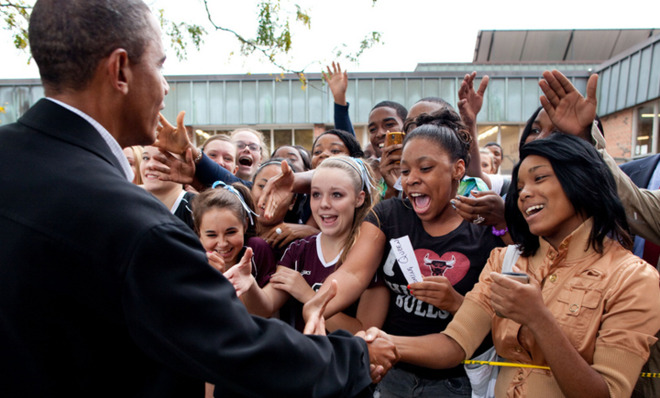ObamaCare's surprising demographic pitfall: Young people
Young people are crucial to ObamaCare's success — but they might not even know it


A free daily email with the biggest news stories of the day – and the best features from TheWeek.com
You are now subscribed
Your newsletter sign-up was successful
ObamaCare needs bros to survive.
Or, more accurately, ObamaCare needs plenty of young, healthy people to enroll for health insurance to offset the costs of enrolling everyone else. Hence, the ObamaCare "brosurance" ads targeting millennial men, and the similar ads aimed at young women.
Yet a Gallup poll released this week found a potentially ominous sign for that effort: Young people are the least familiar of any demographic with ObamaCare.
The Week
Escape your echo chamber. Get the facts behind the news, plus analysis from multiple perspectives.

Sign up for The Week's Free Newsletters
From our morning news briefing to a weekly Good News Newsletter, get the best of The Week delivered directly to your inbox.
From our morning news briefing to a weekly Good News Newsletter, get the best of The Week delivered directly to your inbox.
Only 63 percent of people 18 to 29 years old say they're familiar with the health care law, compared to 72 percent for all adults nationwide. On the other side of the equation, among the oldest demographic — those 65 and up — familiarity with the law peaked at 77 percent.
Dovetailing with those findings, a Kaiser Health survey from August reported that 62 percent of adults 18 to 25 years old felt they didn't have enough information about ObamaCare.
If not enough young people sign up, it could cause premiums to rise for everyone else. In a worst case scenario, it could theoretically trigger an "actuarial death spiral" in which rising costs spook even more young people into staying uninsured, causing prices to rise higher and ultimately buckling the entire system. That's why conservative groups worked so hard to convince young people to sit out the exchange marketplace — remember the creepy Uncle Sam ads likening ObamaCare to sexual assault? — in the hopes that it would undercut the law itself.
Polling is one thing, but actual enrollment data is another. And on that front, too, there is a sign of potential trouble.
A free daily email with the biggest news stories of the day – and the best features from TheWeek.com
October enrollment numbers were weighted heavily toward the older end of the age spectrum. In Kentucky, almost three-quarters of all enrollees were over 35 years old. And in California, people between 55 and 64 made up 34 percent of all enrollments — despite comprising only 11 percent of the state's population.
Still, the lagging millennial enrollment numbers will only become a serious problem if the trend holds. And health care experts expected that older people, who are more concerned with their health care coverage, would be more likely to sign up in ObamaCare's first few weeks, while younger people would be more likely to procrastinate.
So despite the early enrollment tilt toward older people, Peter Lee, head of California's state-run exchange, called the enrollment numbers for young people "very encouraging." And Young Invincibles, a health care advocacy group for younger people, said in a statement that October's enrollment tallies showed that "young adults are engaged and excited about their new options even at this very early stage in the enrollment process."
Enrollments are already expected to spike over the coming weeks and months as the individual mandate penalty draws closer. And for its part, the White House is preparing to launch a massive outreach effort ahead of the December 23 deadline to enroll in coverage that kicks in at the start of the year.
If the PR blitz works, the administration can alleviate the early enrollment imbalance by convincing more bros to put down the beer pong balls and sign up for insurance.
Jon Terbush is an associate editor at TheWeek.com covering politics, sports, and other things he finds interesting. He has previously written for Talking Points Memo, Raw Story, and Business Insider.
